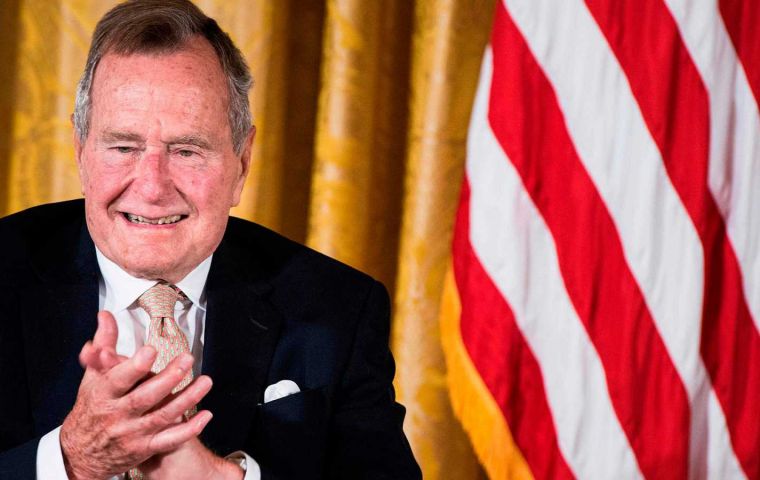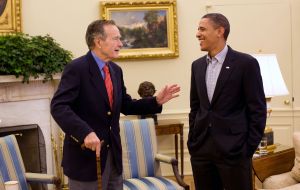MercoPress. South Atlantic News Agency
George Bush, the graceful victor of Gorbachev and the Soviet empire has died
 Bush “guided our nation, and the world, to a peaceful and victorious conclusion of the Cold War,” Trump said
Bush “guided our nation, and the world, to a peaceful and victorious conclusion of the Cold War,” Trump said  The son of a U.S. senator, the elder Bush had big shoes to fill when he succeeded Ronald Reagan, a larger-than-life figure who was once his rival
The son of a U.S. senator, the elder Bush had big shoes to fill when he succeeded Ronald Reagan, a larger-than-life figure who was once his rival  Barack Obama in a statement called Bush “a patriot and humble servant...While our hearts are heavy today, they are also filled with gratitude.”
Barack Obama in a statement called Bush “a patriot and humble servant...While our hearts are heavy today, they are also filled with gratitude.” George Herbert Walker Bush, the World War II veteran who was elected the 41st president of the United States and fathered the nation's 43rd, died late Friday at the age of 94, his family announced in a statement. The Republican spent decades serving in government before ascending to the nation's highest office, having served as United Nations ambassador, CIA chief and vice president under Ronald Reagan, a towering political figure still venerated by the GOP.
Bush advocated a “kinder, gentler” form of conservatism, pursued policies that helped topple the Soviet empire and initiated military campaigns that ousted one foreign dictator while crippling another. He lived longer than any other U.S. president, and presided over the demise of the Cold War, punctuated by the fall of the Berlin Wall.
President Donald Trump, who rose to power by railing against the Republican establishment embodied by the Bush family, hailed the 41st president as a man of “sound judgment, common sense and unflappable leadership,” a statement from the White House read.
Bush “guided our nation, and the world, to a peaceful and victorious conclusion of the Cold War. As president, he set the stage for the decades of prosperity that have followed,” Trump said.
The former president also was lauded by the 44th U.S. president, Barack Obama, who in a statement called Bush “a patriot and humble servant...While our hearts are heavy today, they are also filled with gratitude.” Bush's life was “a testament to the notion that public service is a noble, joyous calling,” the statement read.
Wife Barbara died on April 17 at age 92. Their 73-year marriage was longer than that of any presidential couple in U.S. history. Their children included former President George W. Bush and former Florida Gov. Jeb Bush.
“George H.W. Bush lived a life that was purposeful, and extraordinarily rewarding — for our nation, and for our world,” said Tricia Nixon Cox and Julie Nixon Eisenhower, the daughters of former president Richard Nixon, in a statement.
“While people everywhere salute and thank George H.W. Bush today, we take special solace in knowing the President and Mrs. Bush are together again,” the Nixon siblings added.
Bush's cause of death was not immediately announced. However, at various times during the last several years, the former president fell ill and was hospitalized. A day after Mrs. Bush's funeral on April 21, the senior Bush was admitted to Houston Methodist Hospital for a blood infection.
He had been taken there in April 2017 and in January 2017 for treatment related to pneumonia, family spokesman Jim McGrath said. During the January hospitalization, Barbara Bush was also treated there after experiencing fatigue and coughing. Their hospitalization came days after they had celebrated their 72nd wedding anniversary on Jan. 6, 2017.
The son of a U.S. senator, the elder Bush had big shoes to fill when he succeeded Ronald Reagan, a larger-than-life figure who was once his rival. He was denied a 2nd term by Arkansas Democrat Bill Clinton, only to forge an unlikely relationship with the same man who ended his political career.
Capping a long political career, Bush was elected to the White House in 1988 on a ticket with Sen. Dan Quayle, defeating Democrat Michael Dukakis and running mate Sen. Lloyd Bentsen in a landslide.
Months before the victory, Bush delivered what became known as his “thousand points of light” acceptance speech at the GOP National Convention at New Orleans' Superdome.
While promising to fight for prayer in public schools and gun rights and against abortion, Bush tried to put a softer face on conservatism, striving to make America a “kinder, gentler” nation.
“Prosperity as a purpose means taking your idealism and making it concrete by certain acts of goodness,” he said. “It means helping a child from an unhappy home learn to read. ... It means teaching troubled children through your presence that there is such a thing as reliable love.”
“The Congress will push me to raise taxes, and I'll say no, and they'll push, and I'll say no, and they'll push again. And I'll say to them: 'Read my lips, no new taxes.'”
It was a vow that came back to haunt him.
During the budget battle with majority Democrats in 1990, he accepted a compromise that resulted in the hike of several existing taxes. Although no new taxes were created, the decision proved costly. Bill Clinton seized upon the perceived flip-flop, helping him oust Bush after a single term despite the Republican's major successes in foreign policy.
From to Manuel Noriega to Saddam Hussein
Five months after Bush's inauguration, he was confronted with China's suppression of the pro-democracy movement — its bloody crackdown on demonstrators in Beijing's Tiananmen Square. Although hundreds of demonstrators were killed, Bush responded with only limited sanctions.
In another five months, the Berlin Wall collapsed, on Nov. 9, 1989 — 28 years after it was erected. Bush greeted the historic event with a reactive response rather than with great enthusiasm. This led to the unification of Germany.
“Of course, I welcome the decision by the East German leadership to open the borders,” he told reporters in the Oval Office. “It clearly is a good development in terms of human rights. ... I'm very pleased with this development.” Pressed about his low-key reaction, he replied: “I'm elated, I'm just not an emotional kind of guy.”
Two years later, the U.S.S.R. formally dissolved with the Dec. 25, 1991, resignation of Soviet President Mikhail Gorbachev, Bush's negotiating partner. In a Christmas speech to the American people, Bush praised Gorbachev's “revolutionary” policies that “permitted the peoples of Russia and the other republics to cast aside decades of oppression and establish the foundations of freedom.”
“I'd like to express, on behalf of the American people, my gratitude to Mikhail Gorbachev for years of sustained commitment to world peace, and for his intellect, vision and courage,” Bush said.
Closer to home, only a month after the fall of the Berlin Wall — matters reached a boiling point in Panama. After months of economic sanctions with Gen. Manuel Noriega over allegations that the Panamanian leader had engaged in drug trafficking and had rigged elections in the Central American country — Bush dispatched troops on Dec. 20, 1989, starting what was called “Operation Just Cause.” The operation involved more than 24,000 troops in what was at that time the largest deployment of US forces since the Vietnam War.
On the fifth day of the invasion, Noriega fled to the papal embassy on Christmas Eve. The building was surrounded by U.S. troops, who resorted to psychological warfare by blasting rock music. Noriega finally surrendered on Jan. 3. He was subsequently brought back to the United States and convicted of drug and racketeering charges. He served 17 years behind bars and died at age 83 in Panama City in May 2017.
Less than a year after the Panama invasion, another foreign crisis absorbed Bush. On Aug. 2, 1990, Iraqi dictator Saddam Hussein invaded oil-rich neighbor Kuwait. Bush responded by assembling an international coalition of nearly three dozen nations.
Under the leadership of Gen. Norman Schwarzkopf, a five-month air bombardment dubbed Operation Desert Shield and the subsequent 100-hour Operation Desert Storm land battle pushed Iraqi troops out of Kuwait. But it stopped short of ousting the Iraqi strongman, setting up the second Gulf War that was initiated in 2003 by Bush 43 and resulted in Saddam's hanging.
In the 1992 election, the elder Bush attempted to capitalize on his overseas successes. In the final days of the campaign, he unleashed this salvo against Clinton and running mate Al Gore: “My dog Millie knows more about foreign affairs than these two bozos”
The electorate didn't buy it. By a margin of 43% to 37%, the Democratic former governor of Arkansas — with little experience in foreign affairs — ended the presidency of the man who prevailed over Noriega, Saddam and the Soviet empire. Third-party candidate Ross Perot swung the election with 19% of the vote.
Despite his disappointment, Bush was ever gracious in defeat. In a handwritten note to Clinton dated Jan. 20, 1993, Bush wrote: “I'm not a very good one to give advice; but just don't let the critics discourage you or push you off course. ... Your success is now our country's success. I am rooting for you.”


![DIO Chief Executive Mike Green with Wg Cdr Fleming in the hangar, which is to be redeveloped. [Crown Copyright MOD 2024]](/data/cache/noticias/102838/130x80/mpc.jpg)

Top Comments
Disclaimer & comment rulesCommenting for this story is now closed.
If you have a Facebook account, become a fan and comment on our Facebook Page!